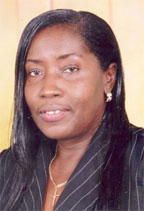-pornography, prostitution rampant
Sexual abuse by teachers, parents and guardians and other adults has been identified as the major cause of growing incidents of inappropriate behaviour by school-age children and Linden leaders are fighting to address it as well as a range of social ills plaguing the community.
It was at a forum on the decline in education held as part of the Linden Town Week celebrations that some of these issues were publicly aired for the first time and regional officials and concerned citizens decided that urgent action was needed to deal with the issues students grapple with daily.
A community forum which included persons from health services, youth services and the welfare and probation offices was subsequently organised. What emerged is that sexual abuse, which includes prostitution and the filming and distribution of pornography are rampant and there is a lack of good parental guidance.
Students from Linden’s five secondary schools: Mackenzie High, New Silvercity Secon-dary, Christianburg Multilater-al, Linden Foundation and Wisburg Secondary detailed grievances including struggles with alternative lifestyles such as being gay or lesbian, child pornography, incest and child abuse, economic hardship, immoral teachers, school gangs and romantic relationships among teens.

The historic session started with the use of a microphone, but later, students were allowed to write down their grievances to facilitate wider participation. This was also instructive as it revealed the declining literacy among school children, which had been ventilated by Region 10 Chairman Mortimer Mingo.
Among the issues raised by students were: older men having sex with their daughters and other young girls; schoolgirls having sex with older men for money because their family can not give them what they want; taxi drivers forcing girls to have sex with them; parents encouraging their children to prostitute themselves to fulfil their personal or family’s financial needs; abuse by stepfathers; students who allow themselves to be taped performing sexual acts with other students as well as with adults.
This newspaper interviewed several persons in the community who claimed to have seen these videos which are sent randomly to mobile phones. In the short films at times the girls give brief interviews indicating that they know that they are being filmed. Many of them are filmed performing sexual acts clad in school uniforms. However, it is not clear if the teens are indeed enrolled at the schools whose uniforms they wear while being taped. Also, the faces of the males in the videos are usually blocked. Girls are often filmed having sexual intercourse with multiple partners.
Students also voiced concerns about gay and lesbian lifestyles and about family members who try to initiate them into the lifestyle.

The students condemned teachers and society’s lax response to their plight, citing a lack of concern and a dormant economy as reasons they believe make it hard for family members to secure employment.
At the close of the session students listed possible solutions, such as asking religious leaders to intervene; developing students’ self-esteem and enforcing laws to prosecute offenders and create order.
Students also listed hormone imbalances, vanity and poor family relations as the root causes of some of these social ills.
A community’s
response
Chairman of the Regional Welfare Committee and the Vice Chairman of the Regional Rights of the Child, under the RDC Valerie Sharpe said the forum was necessary to connect with the youth to get a true picture of the deeper problems plaguing the region. She pointed to other signs: plummeting grades, students liming at the minibus park after school hours and in the evenings, the use of weapons in fights, the widely reported trend of school gangs, gambling and the making and renting of pornography in the school environs. Sharpe is also a pastor and the general manager of the Linden Enterprise Network which manages the Region 10 Business Centre, once a component of the Linden Economic Advancement Programme.
Sharpe said a public meeting held at the municipal bus park after the forum was not very well-received. Therefore, the Welfare Committee took a decision at a statutory RDC meeting on May 6 to hold another forum with the major stakeholders, later that month. Several pastors, probation and social and child protection services representatives, Linden town health and education officials, the Regional Parents Teachers Association, NCN Linden Branch Manager Andrew McBean, the Social Workers Association and the RDC Executive Officer Henry Rodney attended this meeting.
Among the many suggestions from this meeting were boosting the role of religious organisations in schools, screening teachers as well as levelling the disproportionate number of male to female teachers in schools. Other forums have been planned within the business community, youth groups and among parents to come up with possible solutions to the problems.
Trudy Scott, Counsellor/ Tester at the Vivienne Parris Clinic, Mackenzie who is attached to the Ministry of Health Youth Friendly Services, noted that the first school is the home and the first teacher, the parent. She counsels 50 persons including youths from ages nine to 24 and older persons monthly.
Scott said socialisation plays a major role in the unbalance among students. “We are our children’s role models,” she said, adding that these issues were prevalent in the society before but were more out in the open now. She said some of the behaviours the students mentioned started around the mid-1990s but the situation is now “out of control.” Some students have said that peer pressure and the lack of discipline at home are the chief contributors to their behaviour and as such she urges parents, teachers, pastors and other community leaders to collaborate to bring about change in the lives of the region’s children.
IMC Chairman Orrin Gordon believes that there are sufficient social workers in the community. He challenged the authorities, to “put them in schools.” Gordon argued that the region has moved away from the culture of sharing and co-operation that kept it together.
He recalled that earlier seniors were concerned about the welfare of children in the community and the entire community talked about achievements made by children, but it is different now. “[I] grew up in a community that really looked out for the kids,” Gordon lamented, adding that the rampant abuse now is distressing.
Foreign influences have stripped away the region’s culture, he said, adding that in order to stem anti-social behaviours the Egbert Benjamin Conference Centre in Mackenzie, took a decision to ban block parties. Instead it hosts steel pan and other concerts regularly to provide an alternative source of entertainment.
This view is also shared by one school principal. He related that though his family “did not have much” he had enjoyed his childhood. Now, he said, children want to be recognised as individuals and want to be identified with particular trends. He too said that the social problems plaguing the community are not new. However, he opined that now children do not care what they do. This principal echoed Gordon’s view that Guyanese are adopting an alien culture. He also said some of the challenges can be addressed in the classroom and the curriculum should be expanded to include life skills that help students make a positive contribution to society.
Fathers needed
Pastor Leroy James, vice president of the Linden Evangelical Ministers Fellowship told a pastoral forum held earlier this month that the absence of fathers from the home has put a strain on families.
He said the meeting saw the problem as a “men crisis” as fathers groom, mentor and instil discipline in the home and their absence is directly related to the increasing number of gangs. He said it has been proven that young men join gangs to gain a sense of identity and belonging, which it is the father’s role to provide.
James said the church body will need to go into schools at assembly time to give talks on morals, though he also believes that more counsellors and social workers are needed in schools. He is therefore calling on religious organisations in Linden across to get involved.
Meanwhile, a prominent educator in the community, who asked not to be named, added that “there is no sound parental guidance.” He advocated that parents spend quality time with their children. He said too many parents work at night and as such children are left unattended. The man said correction by the rod is now called abuse and if parents do not rectify bad behaviour in children it leads to gross indiscipline.
He opined that mothers are also falling short of their role. Some of them do not talk to their children about becoming young adults and as such they are experimenting. Children should be able to talk to their parents too, he pointed out.
The man also advised parents to send their children to church and monitor the programmes they view on the television.
Poverty
Poverty is not an excuse for immorality, Pastor James believes, but “it has been a major contributory factor.” He said there is a connection between poverty, poor educational performance, and sexual and moral abuse.
The IMC chairman disagrees in part. Gordon said although poverty is a factor in the social decay pervading the town, contentment should be taught. He feels strongly, that if one keeps blaming society’s ills on poverty, then society as we know it will be no more.
Meanwhile, House of Prayer where James is the lead pastor hosts a phonics programme that teaches Reading, Spelling, Mathe-matics and English for children ages four to adult. In addition, the church collaborates with Hands of Love, a UK-based charity which provides 70 children from various schools in the community with monthly food hampers. James said he would like to see organisations such as these given more support. The initiative is supported in part by furniture giant Courts.




